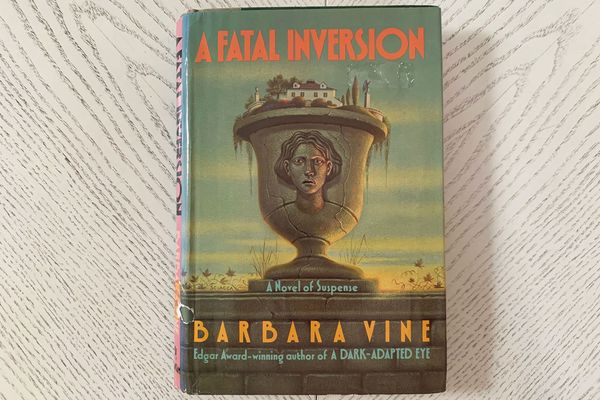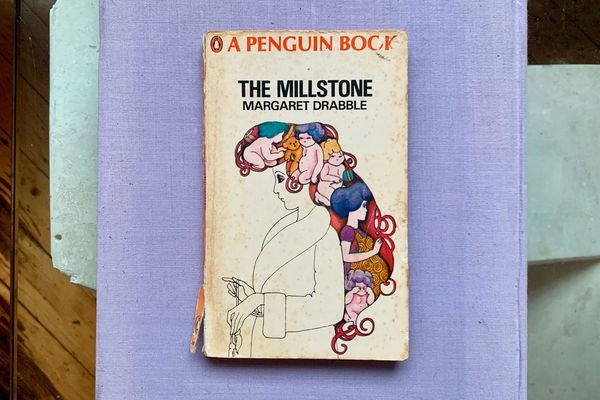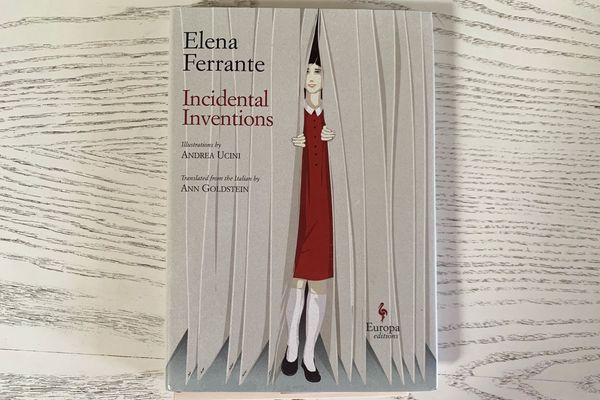
Certain books are connected to the physical circumstances of reading them. I read Lionel Asbo on a Chinatown roof, sunbathing and trying (not hard) to avoid staring at the woman across the street who walked around nude with the blinds open. Crime and Punishment in a library for eight-hour stretches while furtively eating protein bars that gave me grisly stomachaches that harmonized beautifully with the book’s tone. I read Elena Ferrante’s first Neapolitan novel over the course of a winter week when my heat was out, spending every night in a scorching tub with the book and a nearby hand towel so I could dry my fingers before turning a page.
Due to the length of the book and the temperature of the apartment, I was soon fully amphibious. One night, after exiting the bath, I went into the next (only) room and heard a crash. The sliding glass door separating tub/shower from toilet/sink had shattered. Every surface of the bathroom glittered with treacherous shards. My first thought was, “Whew, glad I wasn’t in the tub,” and my second thought was, “How do I extract the Ferrante book on the floor that is covered in glass without maiming myself?” The answer: kitchen tongs, paper towels, a spirit of determination, etc. I wish you a holiday season of good books absorbed in structurally sound conditions.
A Fatal Inversion by Barbara Vine
Mystery, March 1987
When faced with a specimen like this, I believe you have not only the right but the duty to judge a book by its cover. My judgment of this was: “a novel of suspense enriched with an atypical amount of horticultural detail and centering on a female corpse at a country manor.” And I was zero percent incorrect. Despite the fact that this volume was written in an era when Reagan was president, and “selfie” was a typo, and the raspberry vinaigrette flowed like wine, it has a timely psychological fixation on narcissism. A group of privileged teenagers party at a mansion, do something awful, and then deal with it in unhealthy ways.
In addition to a clever plot, there is a torrent of factoids that might be trivial to members of the author’s precise class and occupation, but would hit an American of 2019 as stirringly exotic. For example, did you know that there were gas stations in midcentury England that gave you a free glass of sherry if you purchased a certain amount of gas? Did you know that the English word for nutria is coypu? Did you know that coypu, which are semiaquatic rodents, have a devastating impact on manicured grounds due to the fact that they binge-eat plants, gobbling up to 25 percent of their body weight in greenery every day? All that and crime in this indoorsy gem!
RIYL: Penelope Lively, knolls, copses, corpses, Anthony Horowitz, Alfred Hitchcock’s Frenzy, pasties (Cornish snack, not nipple sheath)
The Millstone by Margaret Drabble
Fiction, 1965
Another imported oldie but goodie! This, the third novel by Margaret Drabble, is an uncomplicated book about a complicated person, and it is only 172 pages long.These elements make it a good commuting or holiday travel option.
Rosamund Stacey is writing her thesis on Elizabethan sonnets when she gets pregnant after having sex exactly one time. (Rough luck.) She has an ambiguous idea that drinking a ton of gin and taking a hot bath might work as an abortifacient, which it does not, and so despite having zero interest in maternity, Rosamund decides to have the baby as a single mother. Like many of Drabble’s characters, this is a person who reflects on her own cleverness and cowardice with a cold facility; she’s introspective to the point of solipsism, and her sense of humor is so deadpan it is practically interred.
The book’s unsexy title obscures its sexy (to me!) themes of liberal hypocrisy, personal freedom, and the artistic upper-middle class that came of age in the 1960s. The person who introduced me to Drabble years ago said this: “Reading The Millstone is like looking at my face in a magnifying mirror: all of my flaws (moral, not cutaneous) are reflected back at me, and it is horrifying but also mesmerizing.” Drabble has written almost two dozen novels, so you can make a journey of ranking them all if you need a winter project.
RIYL: Anthony Powell, Greta Gerwig, Ovaltine, Desert Island Discs, sorting and reading online customer reviews from negative to positive
Incidental Inventions by Elena Ferrante
Nonfiction, November 19
Until now, I haven’t been aware that a category we could call “minor Ferrante” exists. Like many people I read her tetralogy and then moved on to her other translated novels, finding them neither as brutal nor enchanting but still addictive. This, on the other hand, is a collection of Ferrante’s random thoughts on random topics. They’re not essays; more like verbal sneezes. (Ferrante calls them “brief trickles of ink.”)
In 2017 The Guardian asked her to write a weekly column. Ferrante agreed on two conditions: One, the editors had to supply her with prompts; and two, the column would last no longer than a year. They agreed. This book is the columns. Prompts include plants, art, addiction, “odious women,” lies, and movies. Don’t start with this if you haven’t read other Ferrante. That would be like, I dunno, watching Boxcar Bertha before Goodfellas. But if you are interested in the experience of having a drink with the author and listening to her muse on various subjects — or you know someone who does and you need a Christmas present for them — here’s your answer.
RIYL: Alice Munro, harboring a dark secret, doing crossword puzzles in pen like a maniac, smoking
WHY DON’T YOU…
Unwrap Careers for Women if you want a novel that’s like a pink bakery box filled with KNIVES?
Give yourself the CREEPS with a lively autopsy of disgust?
Get your mind bent on Andrea Long Chu’s argument that EVERYONE IS, IN FACT, FEMALE — and everyone hates it?
Dive into a rollicking cancer novel? (Now you’ve read everything!)
Skewer yourself like a KEBAB on the sharp stick of Margaret Atwood’s intellect in an interview I did with her?
Find nice copies of your top-three books and give them to a loved one for the holidays? It’s a DIY BOX SET!
SUGGESTED PAIRING
Pair the waning hours of daylight with a brief poem of unmatched Russian gloom?
More From This Series
- Matrix and 9 Other Reads I Can’t Get Out of My Head
- The Listening House and 9 Other Reads I Can’t Get Out of My Head
- The Plot and 8 Other Reads I Can’t Get Out of My Head





